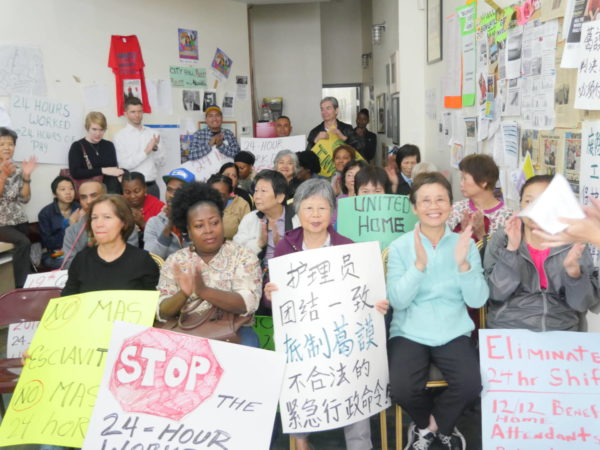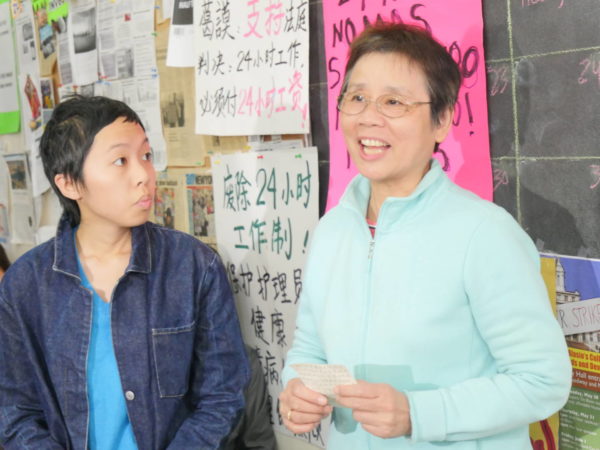New York, NY – Home health aides locked in a system that shortchanged for years, are being urged, this week, to join the collective fight to recover lost income and end unpaid 24-hour shifts once and for all.

The rallying cry follows a new court order nullifying the Department of Labor’s rationale for allowing systemic wage theft to continue unchecked throughout the home care industry.
On September 25, New York State Supreme Court Judge Eileen Rakower ruled the DOL’s “emergency regulations” allowing home health aides to be paid just 13 out of 24 hours on the job, “null, void, and invalid.”
The DOL had argued that paying home health aides for every hour they are actually on the job — as previous court orders have insisted — would spark the “collapse” of the home care industry.
“The state is always saying that; the state is always going to say that,” Mika Nagasaki, an workers’ advocate with the National Mobilization Against Sweatshops [NMASS] and the Chinese Staff & Workers Association [CSWA], said after Judge Rakower’s findings. “But just as Justice Rakower said, there really was no proof that the collapse of the industry was imminent. There was nothing beyond people gossiping.”
Alvaro Ramirez, 42, worked as a home health aide for 15 years before resolving, in 2015, to stop doing 24-hour shifts that only paid him for half the time. But when he did, he says his bosses at the United Jewish Council immediately fired him.
“It was really hard to be away from my family for 24-hours,” Ramirez told LaborPress. “If I did it for three days straight, my knees would be busted up and I was just totally exhausted. All 24-hours I had to be at the bedside of the patient the whole time. They had to be turned; their diapers needed to be changed.”
Last year, home health aides like Ramirez won a series of decisive court victories declaring that they must be paid for every hour they are on the job. The DOL, however, responded with a set of “emergency regulations” that allowed the shortchanging of home health aides — the overwhelming number of them minority women of color and immigrants — to continue unabated.
The state is always saying that; the state is always going to say that — but just as Justice Rakower said, there really was no proof that the collapse of the [home care] industry was imminent. There was nothing beyond people gossiping. — Mika Nagasaki, NMASS, CWAS
Yusiao Uan, 61, worked 24-hour shifts as a home health aide for more than a decade. When she finally began to assert her rights, Uan said Chinese American Planning Council bosses told her to “go find some other agency.”
“At night, we had to take care of the patients, no sleep, no rest — I should get paid for all 24-hours,” Uan said.

Despite their spate of court victories, however, shortchanged home health aides won’t be getting their hands on unpaid wages anytime soon. Several class action lawsuits are making their way through the courts in an effort to secure back pay for home health aides. But those not part of those class action suits, will have to pursue their individual cases on their own. And Judge Rakower’s ruling not withstanding, it’s not like agencies employing home health aides will start paying them for every hour they’re on the job.
“Right now, you can’t say no,” Nagasaki said. “There’s no protection for workers who say they don’t want to do these 24-hour shifts. Many workers have tried and been retaliated against.”
That’s why home health aides, along with allies from NMASS and CSWA, are calling on Governor Andrew Cuomo to take the lead in outlawing 24-hour shift scheduling, and requiring round-the-clock patient care is split between home health aides.
“We feel like it’s not enough for workers, individually, to refuse to work 24-hour shifts because then you’re retaliated against,” NMASS’ Joann Lum said. “That’s why we feel legislators really need to legislate this — prohibit 24-hour shifts. Make it so that it is 12 [hours] and 12 [hours] so that people can make a living and be able to protect their health and provide proper care for their patients.”
Home health aide Elvia Fernandez said that working 24-hour shifts deprived her of her own family, in addition to hurting her hip, wrist, knees, shoulder and back.
“I couldn’t share the best moments with children,” she said this week. “They had a lot of problems in school. I arrived home very tired and couldn’t give them the attention I should have. We’re not slaves — we demand no more 24-hour shifts. Unite with our fight and call: 212-358-0295.”
Fellow home health aide Lai Yee Chan, 63, said she hopes Governor Cuomo has “learned a lesson and stops forcing us to work 24-hour workdays.”
“Twenty-four hour workdays not only destroys our health, our family and our life, it also denies our patients proper care. Is this American? It is shameful,” Chan said.
Governor Cuomo’s Office has not yet responded to requests for comment.



